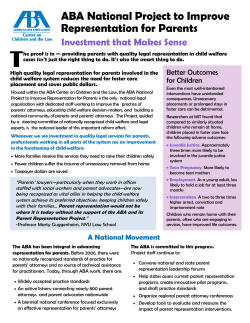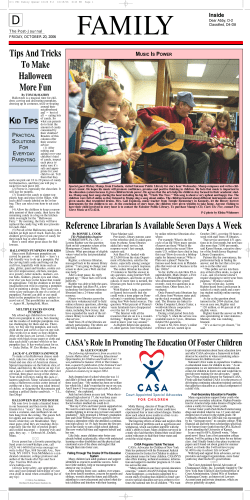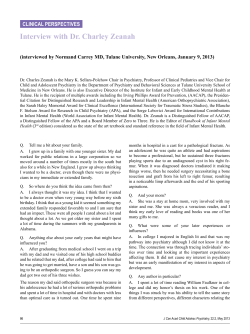
Foster Care in Saskatchewan FREQUENTLY ASKED QUESTIONS
Foster Care in Saskatchewan FREQUENTLY ASKED QUESTIONS Is there training to prepare foster parents to care for foster children? As part of the family assessment home study process, prospective foster parents participate in PRIDE Pre-Service Training. Topics focus on understanding the foster care system, including the role foster families play in supporting the families of the children in care, the caseworker’s role, and the impact of fostering on the foster family and the Prospective foster families participate in exercises and activities in order to prepare them to work with children and families before a child is placed in their home. Do foster parents choose the children who come into their homes? Foster parents select the age range and gender of the children who come into their home, and they help to decide if a child’s placement in their home is appropriate. Every attempt is made to match the child to a foster family that is able to meet the child’s individual needs. The primary goal of foster care is to provide children with a family environment where positive relationships and child development are encouraged. The ultimate goal is to reunite the children with their families when it is safe to do so, by promoting healthy relationships among the caregiver, the child and the child’s family, and encouraging as much contact between the child and his or her family as possible. The Children The Foster Families Ideally, all children would be cared for within their own family homes, but this is often not the case. Some children live in unsafe environments and foster care is ultimately required. Foster families are an invaluable resource to children in need of a safe, encouraging atmosphere. Foster parents are part of a team, working with and supporting a child and his or her family. There are a number of reasons why children may be placed with foster parents: Foster families are needed to provide care for children ranging in age from infants to 21 years of age. Placements may last from one day to several years, depending on each child’s individual circumstances. Is there a limit on the number of children that can be in one foster home? • neglect The Ministry’s policy states that there can be no more than four foster children in a foster home, but allows for exceptions in the following circumstances: emergency placements, placement of large sibling groups, or placement of children who have previously lived in the same foster home. • physical abuse • emotional abuse • sexual abuse • exploitation Who are the children in need of homes? Children in foster care come from all ethnic and religious backgrounds, and they have the same interests, abilities, dreams and needs as all children. These children have been removed from their homes because of abuse, neglect or life-threatening conditions. They may have serious emotional and behavioral problems. These children need safety, security, attention and support. How long does a child stay in care? A child may be in a foster home for one day, a few weeks, several months or even years. Each child’s caseworker works with the foster parents regarding case planning and the individual needs of the child. These elements will determine the length of the child’s stay. Our hope is that these children will require foster care for only a short period of time before returning to a safe environment with their natural family, extended family or cultural community. However short their time may be with a foster family, it is It is a time when the child will need to feel cared for, protected, and safe. Above all, each and every child needs to know that they are of value to the world. There are many aspects to participating as a foster family. These families: • share their homes and families with the children in their care; • help children reunite with their natural families; • help children move on to another permanent home when necessary; • help young adults move on to independent living; • share the parental role for a foster child along with Social Services and the natural parents; and • participate in the foster child’s case planning and work as a team along with the natural parents, Social Services caseworkers and other professionals. What are the required physical aspects of a foster home? families who can help children maintain their cultural identities. approval process and at each subsequent annual review of the foster home. Saskatchewan Foster Families Association Children in foster care may have a bedroom of their own; however, they may also share a room with a child of the same gender and compatible age. The Saskatchewan Foster Families Association (SFFA) is a registered charitable organization that works closely with the Ministry of Social Services to encourage, promote and assist in developing healthy foster families. It also acts as a collective voice for foster families throughout the province. Once approved by Social Services, foster families are entitled to membership in the SFFA. May foster parents adopt their foster children? If the child is registered for adoption, the foster parents may ask to be considered with other prospective adoptive parents. As well, foster parents may adopt a child and still continue to foster other children. For more information or to become a foster parent, call: 1-800-667-7002 Types of Foster Care Emergency • Provides immediate care to children on short notice at any time of day or night, often with little information. Children may be in poor health or physical condition, and may require care for up to two weeks. Short-term • Provides care and prepares children for transition to their families, to extended family, or to another permanent home. Long-term • Provides care to children who are unable to return to their natural families. In some cases, this may be until the children move to independent living. Therapeutic Foster Care • Is a specialized program for those children and youth who present a range of behavioral, social, developmental and emotional problems that make it their needs. For some of these young people, placement with a therapeutic foster family is a preferred alternative to institutional care. • Therapeutic foster families receive specialized training and support. Financial Support Foster parents receive a monthly payment to cover the costs associated with raising a child. The payment allows foster parents to provide for physical needs including food, shelter, clothing, personal items, transportation and recreation. Additional funds may be available for expenses such as sports, music lessons, cultural activities and other special needs. These funds are based on the developmental needs of each child and are assessed within individual case plans. Children in foster care are entitled to receive supplementary medical services, which provide for most health needs, including prescription medication, eye care and dental services. behavioral or medical needs may require additional funds beyond the basic compensation rates. See insert for current foster care basic compensation rates. To Become a Foster Parent You may be: • single, married or living common-law; • of any race or ethnicity; • with or without children of your own; • a renter or homeowner; and • experienced with or willing to learn about children with special needs. You must be: PRIDE (Parent Resources for Information, Development and Education) PRIDE is a new competency-based model of practice implemented by the Ministry to aid in the development and support of foster families. PRIDE model, and are fundamental to achieving the ultimate goal in foster care: 1. Protecting and nurturing children. 2. Meeting children’s developmental needs and addressing developmental delays. 3. Supporting relationships between children and their families. 4. Connecting children to safe, nurturing relationships intended to last a lifetime. 5. Working as a member of a professional team. PRIDE CONSISTS OF: • able to pass a criminal record check (applies to all adults living in the home); and Pre-Service, CORE, Advanced and Specialized training modules. • able to pass a child protection screening, having no current or recent child protection history. PRIDE Pre-Service Steps to Becoming a Foster Parent 1. Complete an initial consultation with a foster care caseworker. 2. Complete an application. 3. Complete a criminal record check. 4. Provide medical information and references. 5. Participate in a family assessment home study with foster care caseworkers. 6. Complete Foster Parent PRIDE Pre-Service Training as part of the family assessment process. • A Saskatchewan Aboriginal cultural component has been developed and will become a part of the PRIDE Pre-Service and CORE training. PRIDE CORE • There are 12 CORE training modules (approximately 100 hours). • These training sessions provide ongoing support and professional development for all approved foster families. • During the annual review process, foster parents and their resource worker will work together to complete a family development plan, designed to assess the family’s strengths and identify needs for support in relation to the competency categories must be understood and adhered to by all members of the professional team. Foster parents and their child welfare worker must work together to support family contact and visits that are appropriate to each individual child and family situation. PRIDE Advanced • The curriculum consists of nine three-hour sessions of group training. • This training prepares prospective foster families by combining a series of in-home consultation meetings with group training sessions. Together, staff and the prospective families determine their readiness to foster. • Pre-service competencies are essential before a child is placed. These are addressed in the pre-service training (e.g. foster parents learn the importance of promoting a child’s positive sense of identity, history, culture and values to help develop self-esteem). • “Extending Our Families Through Unity” is a First Nations • Experienced foster families acquire advanced competencies. For example, foster parents learn the Ministry's approved methods to manage aggressive behaviour and can demonstrate the skills appropriately. enhance the foster parents’ performance as members of a professional team. PRIDE Specialized • Experienced foster families acquire the knowledge and skills to work in a particular area of expertise (e.g. working with teen parents, or caring for medically fragile infants).
© Copyright 2026



















